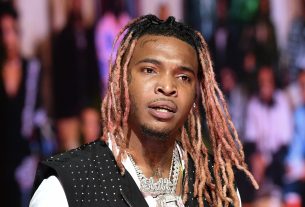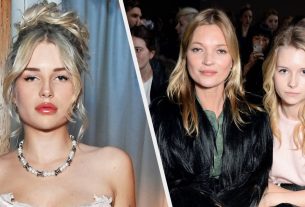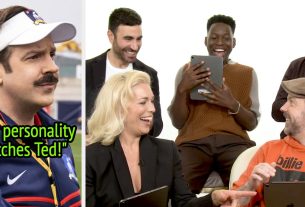Last year, the To All the Boys actor told NBC Asian America, “I believe my life purpose as an entertainer is to make people feel seen and make people feel less alone. I hold a lot of pride in doing that. I think film and television is like this weird little world, and if you don’t have a mission, it can sometimes feel a little superficial, like, what am I doing? And so I really, really, really want to represent the Asian community and normalize seeing us in mainstream film and television.”
She continued, “Media in general influences — for good or for bad — the real world. And I don’t understand why, in film and television or particularly in this genre, why it’s been mostly reserved for women that do not look like me. I just don’t understand that, because the world is deeply and vastly colorful, and I’m like, well, don’t you want to watch something that accurately reflects the world as the way that it really is, and not just, like, the Kate Hudsons of the world getting to fall in love in a rom-com? Honestly, it just baffles me.”
During Variety’s Actors on Actors interview with Daveed Diggs, Anthony said, “It really bothered me that I’ve done seven Marvel movies where every producer, every director, every stuntperson, every costume designer, every PA, every single person has been white. We’ve had one Black producer; his name was Nate Moore. He produced Black Panther.”
He added, “But then, when you do Black Panther, you have a Black director, Black producer, a Black costume designer, a Black stunt choreographer. And I’m like, that’s more racist than anything else. Because if you only can hire the Black people for the Black movie, are you saying they’re not good enough when you have a mostly white cast?”
During a 2021 interview, the Umbrella Academy actor told Oprah that there should be more roles where “trans people [get] to be people,” rather than storylines always focusing on “intense trauma, violence, or the idea that there’s mental illness.” He said there need to be “new narratives” that represent the full humanity of trans people.
In order for that to happen, Elliot said, trans folks need the opportunities to tell their own stories. “What’s so important in terms of representation in front of the camera but equally behind the camera — for writers and directors to continue to tell more stories from the perspective of trans people.”
In a 2018 essay penned for Teen Vogue, the 13 Reasons Why actor wrote, “Thanks to years of tropes and typecasting of Asian men in entertainment, you may make assumptions about me without even knowing me. If you see me walking down the street, I don’t want you to immediately pin me as a martial artist or a nerd without getting to know me. Sure, I may know martial arts and I may have nerd tendencies, but at least buy me a coffee and find those things out before just assuming. You’ll also learn I play guitar, not violin, and I practice capoeira, not Tae Kwon Do.”
Ross added, “How many times have you seen an Asian American actor play the romantic lead? A villain that isn’t one-note? What about a character whose function was more nuanced than that?”
In an essay for Glamour, she shared her experience as a young actor in Hollywood, where Black hairstylists weren’t often hired. “I realized very quickly that there were many people in hair and makeup trailers who were totally unqualified to do my hair. Hairstylists used Aqua Net–like hairspray with crazy amounts of alcohol, which caused chunks of my hair to literally come off on a styling tool,” she said.
Now that she’s come so far in her career, she has the power to choose her own stylists. However, she tweeted that it’s still challenging to find good ones, for numerous reasons. “The outright refusal to hire Black & POC folks who are in the union AND the insane and unequal hurdles that are put up for these artists to join the union. When talent puts Black or POC artists in their contract, the treatment of those artists when they are working is shameful.”
The outright refusal to hire Black & POC folks who are in the union AND the insane and unequal hurdles that are put up for these artists to join the union. When talent puts Black or POC artists in their contract, the treatment of those artists when they are working is shameful. https://t.co/aIn33XueHx
Gabrielle Union / Via Twitter: @itsgabrielleu
“When I started out, it was not very clear that there was any room for someone like me,” she recalled during a 2022 interview with MSNBC’s Morning Joe. “Movies like Real Women Have Curves, TV shows like Ugly Betty, they had never existed before. I think we have a long way to go, and a lot of it has to do with decision-makers. We need to see more Latinos in executive rooms, as producers, as the folks who are making decisions about what stories get told and who gets to tell them.”
She continued, “I’m a lot more aware now of what it takes to really make it in an industry where there is no representation [and] there aren’t people like you invested in your stories. If it’s gonna change, we’re the ones who have to change it.”
Last year, Quentin Tarantino made some controversial comments about Marvel movies. On the 2 Bears, 1 Cave podcast, he said, “Part of the Marvel-ization of Hollywood is you have all these actors who have become famous playing these characters. But they’re not movie stars. Right? Captain America is the star, or Thor is the star.” And in 2019, Martin Scorsese said that Marvel movies were “not cinema.”
Simu responded to both directors in now-deleted tweets. “If the only gatekeepers to movie stardom came from Tarantino and Scorsese, I would never have had the opportunity to lead a $400 million plus movie. I am in awe of their filmmaking genius. They are transcendent auteurs. But they don’t get to point their nose at me or anyone,” he wrote.
“No movie studio is or ever will be perfect. But I’m proud to work with one that has made sustained efforts to improve diversity onscreen by creating heroes that empower and inspire people of all communities everywhere. I loved the ‘Golden Age’ too.. but it was white as hell.”
During a 2020 interview with IndieWire, the Roma actor said, “My objective in my career is to give visibility to all of us who have been kept in the dark for so long. The acting projects I’m working on are moving slowly because I’m putting all my efforts in not being pigeonholed because of my appearance.”
Yalitza continued, “Wherever I go, I’ll always be proudly representing our Indigenous communities. I’m conscious that every step I take may open doors for someone else, and at the same time, it’s an opportunity for society to realize we are part of it and that we are here.”
After starring in Captain Marvel — the MCU’s first woman-led superhero movie — Brie told Variety, “I’m happy to be on the forefront of the normalization of this type of content and to prove once again that representation matters. Diverse storytelling matters, the female experience matters, and these are markers. So it’s something I’ve always known, and I think a lot of people always knew, but this is just normalizing.”
The interviewer brought up that he never thought he’d see an LGBTQ superhero, and Brie replied, “That breaks my heart to hear that, because there’s no reason. I don’t understand how you could think that a certain type of person isn’t allowed to be a superhero. So to me, it’s like, we gotta move faster. But I’m always wanting to move faster with this stuff.”
During a 2020 interview with the Sydney Morning Herald, the Elementary actor opened up about the struggle of being a young Asian actor in Hollywood. “I think I was just too naive and didn’t know what was ahead of me or what I was going to be up against. I had some idea when I got to LA, because a friend of mine would have 10 auditions in a day or a week, and I would have maybe two or three in a month, so I knew it was going to be much more limited for me.”
In 2019, she told Variety, “Everyone was willing to have me on their roster, but not commit to me because they didn’t know, realistically, how many auditions I could get. The challenge from the beginning was just the diversity, and ‘We don’t really know what to do with you,’ and ‘There’s not going to be a lot of work for you.'”
In 2016, all of the Oscars acting nominations went to white people for the second year in a row, sparking the #OscarsSoWhite conversation and boycott. At a gala, David slammed the Academy of Motion Picture Arts and Sciences, saying, “For 20 opportunities to celebrate actors of color, actresses of color, to be missed last year is one thing; for that to happen again this year is unforgivable.”
He added, “The reason why the Oscars are so important is because it is the zenith, it is the epitome, it is the height of celebration of artistic endeavor within the filmmaking community. We grow up aspiring, dreaming, longing to be accepted into that august establishment because it is the height of excellence. I would like to walk away and say it doesn’t matter, but it does, because that acknowledgment changes the trajectory of your life, your career, and the culture of the world we live in.”
During her acceptance speech for the Human Rights Campaign’s Visibility Award, the Hunger Games actor said, “It can definitely be strange to be vulnerable in matters of personal identity when you’re navigating it in a public manner, specifically within the very straight confines of Hollywood.”
She continued, “Had I had more representations of Black gay women growing up, I probably would have come to conclusions around my sexuality much earlier, because I would have had more of a conception around what is possible and okay.”
During a 2022 interview with StarWars.com, the actor shared that growing up with mostly white faces in TV and movies deeply influenced what she believed was possible for herself. “I was auditioning for a lot of stuff and getting really close to [landing roles], mostly sitcoms, and at the time, I remember telling myself, Oh, Kelly, one day in a perfect world, you’ll be able to be the sidekick on a sitcom,” she said.
“So my big break was in 2016 when I was offered the role of Rose in Episode VIII. As I was auditioning for Star Wars, it was a six-month process. I never thought to myself that I would actually get it because, again, I keep going back to this idea, this culture of belief. But, like, I grew up watching those movies, and they are all white. So I just was like, Oh, I’m obviously not gonna get this, but one day, I’ll tell my grandchildren how lucky I was to audition for this thing, and that was a cool thing that I did.”
Kelly said, “I still think that there are just things inside of me that I have to overcome … and I would say that because of the world that I grew up in, there a lot of things, instinctually, that I do or that I think that I have to unlearn, because I was so socialized to believe that certain people belong in certain spaces and other people don’t.”
In 2019, the Westworld actor told Remezcla, “I’m someone who talks a lot about representation. It’s important that we see more Black women onscreen. Sometimes there isn’t necessarily a conversation around the nuance of what kind of Black woman. I mean, we are not a monolith.”
Tessa continued, “In Hollywood, I don’t think there’s enough real representation and nuance in that space. I see a lot of incredible Afro-Latinas working, but I’m not sure that there are enough stories told that speak to that particular experience.”
During a 2021 interview with the Guardian, the Lion actor shared that he expected big roles after the success of Slumdog Millionaire, but that didn’t happen. Instead, he had to “wait for an Indian role to come by, where I could put on a thick accent because there wasn’t anything else. It was literally the clichés: goofy sidekick, taxi driver.” For a while, he didn’t work.
He’s also struggled in an industry where he’s often viewed as not Indian enough and not British enough. “Where am I allowed to exist? How specific are we going to get with this? What does it mean to be an actor — to just be yourself? Am I only allowed to play a guy who’s 31 years old? Are you going to check my blood type?” he asked.
On an episode of the Highly Relevant podcast, the White Lotus actor said, “In my own way, I feel like I try to portray Hispanic characters that aren’t the stereotypes because I think that’s one thing we’re really up against. Especially Latina women.”
She continued, “There’s such a stereotype there, and there are so many different kinds of Hispanic women and people that we just don’t even see. They’re not represented on film or on television. It’s just the same archetypes over and over again.”
Last year, the Hawaii Five-0 actor told Esquire, “When my kids are watching shows, my wife and I always did this natural thing, which was whenever there was an Asian face onscreen, to point it out to say, ‘Look.’ Whether it was a major motion picture or commercial, you say, ‘Look.’ And so just by doing that, it kind of created a dynamic where you would notice when you didn’t see it.”
Daniel continued, “‘Thank you for thinking about that,’ I would tell them. Because it’s true. As much as I love that show, when it came to diversity, it was … challenged, shall we say. It’s important that we look at all of our entertainment through our lens.”
During a 2019 interview with Glamour UK, the Grown-ish actor recalled, “I was talking to an editor of a magazine, and this magazine was supposed to represent women in Hollywood. It was really important to me that there was diversity in who they chose to celebrate. We reached out, making sure they were considering it, and they were like, ‘Of course!’ I show up, and the three actresses who are there — who are wonderful people, by the way — look like triplets. But they had chosen the most homogeneous group possible.”
Yara added, “I know my experience is not everyone’s experience, and it becomes reductive if I’m the only person there to represent ‘the other.’ I chose to opt out of the roundtable.”
During a 2021 interview with Vogue, the Eternals actor said, “It’s only a fairly recent thing that Asian females have been able to be the protagonists of stories. Individual successes are one thing. But structurally, when you look at who can actually get projects green-lit in the UK, who are in those positions of power, those gatekeeping positions — there aren’t that many Asians. There aren’t many people of color in those positions.”
In an essay written for ShondaLand, the Orange Is the New Black actor wrote, “I have been obsessed for a long time with how the perception of trans people has been shaped by the ways we have been represented in film and on television. I grew up in Mobile, Alabama, with media images of trans folks that exacerbated the shame I felt about who I am. As a child, I was endlessly bullied, and my teachers warned my mother about my future if I didn’t change.”
Laverne also wrote, “In a recent study, GLAAD found that 80% of Americans don’t personally know someone who is transgender. So much of what most Americans know (or think they know) about trans people, they learn through the media. This makes the ways in which trans folks are portrayed on screen a matter of life or death for many of us.”
21.
And finally: Viola Davis
While discussing her recent roles in a 2019 Yahoo News interview, the How to Get Away With Murder actor said, “The most important question you can ask as a person is ‘Why?’ Why do I have to be lighter than a paper bag in order to be sexualized? Why do I have to have a lighter voice? Why do I have to be younger? Why can’t I be exactly who I am, and be as complicated as I am?”
She continued, “I reject everything anyone ever said about me or anyone who has ever looked like me. I’m all things, everything. That’s what I want to interject out there.”



